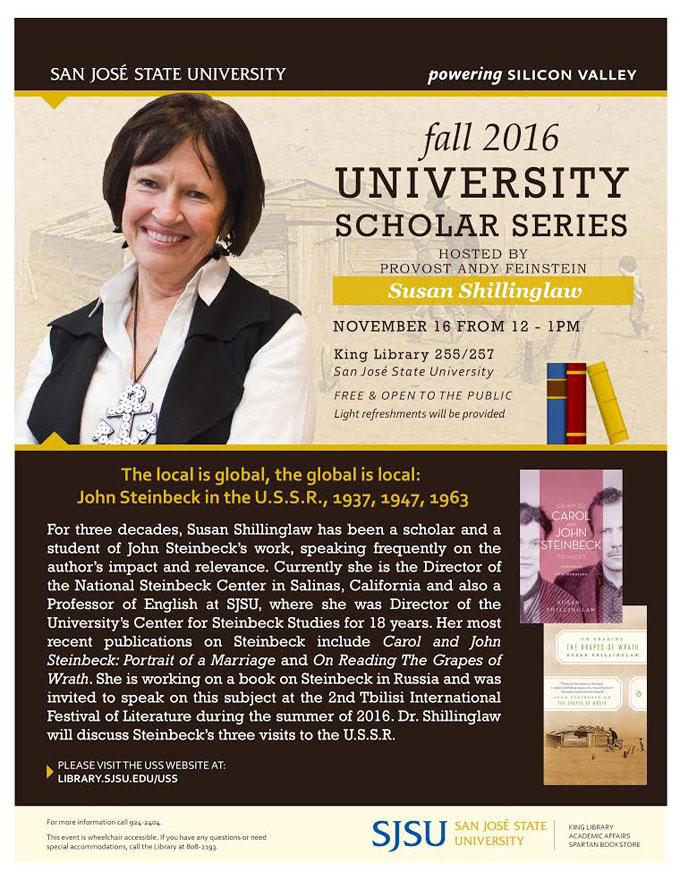Concerns about the future of U.S.-Russian relations under President-Elect Donald Trump have led students of John Steinbeck to reconsider Steinbeck’s views on Russia, and his writing on U.S.-Russian relations, during the presidencies of Franklin Roosevelt, Harry Truman, and John Kennedy. Silicon Valley fans will have a chance this week to learn much more about this timely topic from Susan Shillinglaw, Professor of English at San Jose State University and a leading expert on John Steinbeck’s life and writing, when she gives a one-hour presentation on John Steinbeck and Russia as part of the school’s fall 2016 Scholar Series. Shillinglaw, who is known for her pioneering research and engaging style, is writing a book on the subject and gave a version of the talk in Tbisili, Georgia (part of the former Soviet Union) earlier this year. Her San Jose State University address will take place in Room 255 of the Martin Luther King, Jr. Library in downtown San Jose beginning at 12:00 noon on Wednesday, November 16, 2016. The event is free and open to the public.
 “Finding Solace in Steinbeck During the Time of Trump” is worth reading in the aftermath of the November 8 election. Posted on November 11 by Stephen Cooper, a public defender and social progressive, it employs quotations from Susan Shillinglaw’s introduction to the Penguin edition of The Grapes of Wrath, as well as the introduction to Working Days: The Journals of The Grapes of Wrath by Robert DeMott, to explore Steinbeck’s relevance to Trump.–Ed.
“Finding Solace in Steinbeck During the Time of Trump” is worth reading in the aftermath of the November 8 election. Posted on November 11 by Stephen Cooper, a public defender and social progressive, it employs quotations from Susan Shillinglaw’s introduction to the Penguin edition of The Grapes of Wrath, as well as the introduction to Working Days: The Journals of The Grapes of Wrath by Robert DeMott, to explore Steinbeck’s relevance to Trump.–Ed.



A better understanding of Russia seems more important now than since the Cold War, so the talk couldn’t be more timely. Do read Stephen Cooper’s passionate piece; Steinbeck’s relevance grows.
The perceptions of the Russian nation and the Russian individual are considerably different today than they were in the time of Steinbeck, Franklin Roosevelt, Harry Truman, and John Kennedy. Steinbeck visited Russia during Stalin’s series of “Five Year Plans” where families were forced to decide which child would starve and what one would survive. In many respects there are similarities with the USA – each having a large portion of the population insufficiently evolved to ably participate responsibly in a constitutional democracy and as a result will suffer under the stern hand of a despotic father figure like Trump and his partner Putin.
In Steinbeck social ecology terms, the power is to have the mob action, and then the mob action creates a movement and the movement operates as a power unto itself. It is hard to get from the mob, i.e. the demonstrations all over the country today protesting theTrump presidency, to the movement but the Standing Rock Sioux did it with their protest over the Dakota Access Pipe Line that would potentially cross their ancestral lands. They now have a movement that is 400 tribes strong and 2,000 plus indigenous groups from around the world involved in the movement. The movement is based on equity, dignity, spiritual preservation, equality, fairness. It is the one movement in our country right now or maybe the world that is fresh and independent of ideological control by anyone. It is the seventh generation, care and love for the children, reveling in being together, face to face communications, and beyond hope, a determination to not be oppressed any more. We need to understand how the Standing Rock Sioux protests went from a mob to a movement and work with it to convert the activity of citizens in their current protests, into a movement–from the ground up with the following statement from Steven Cooper in mind:
“We citizens who reject totalitarianism, who believe in freedom, equality, and happiness for all – not contrived, ill-conceived soundbites on hats – must do as Steinbeck did. We must, in our lifetime, in the most human, most piercing, most painstaking and revealing of ways, highlight the stories of the poor, the marginalized, the disenfranchised, and the vulnerable.”